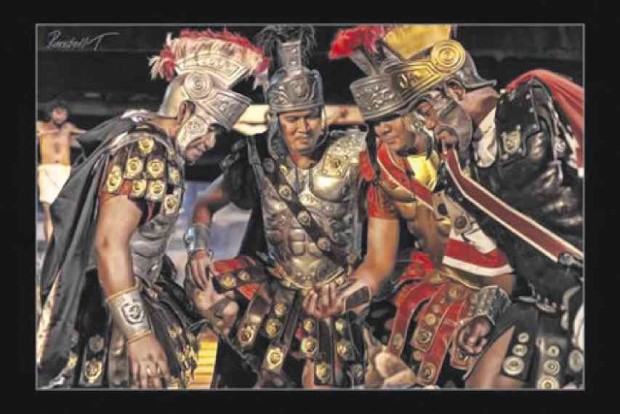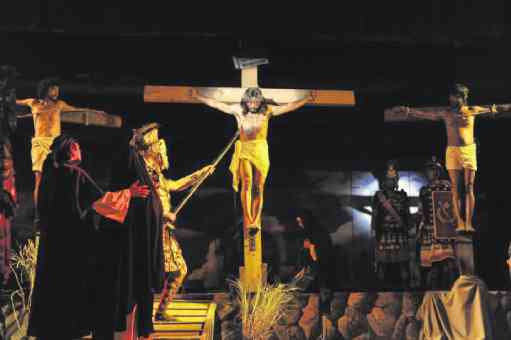‘Senakulo’ rooted in faith, family in Cainta

ON WITH THE SHOW—AND COMMUNITY SPIRIT Even Cainta natives who already live abroad send donations to ensure that the homegrown Lenten theater group, Samahang Nazareno Inc., can successfully mount its yearly “senakulo” or Passion play. CONTRIBUTED PHOTOS
THE PASSION for Lenten traditions never dies and is assured of new blood in Cainta, Rizal province, home to an award-winning and government-subsidized “senakulo,” where for a few summer nights tricycle drivers, housewives, students and other ordinary folk get to play sword-and-sandal characters in a poetic retelling of the story of Christ.
This form of “people’s theater” is thriving in Cainta despite the municipality’s rapid urbanization, thanks to Samahang Nazareno Inc. (SNI), a troupe established in 1960 and which currently counts at least 200 members who devote time and effort to the yearly production.
“It’s not only an annual occasion but is in fact a part of our lives. Everyone has a role to play,” said Kristine Amoranto, the SNI treasurer. “It is deeply rooted in every family.”
Almost half of SNI’s active members are children and teenagers who are “very eager and enthusiastic.” Even on nights when the script doesn’t call for their characters, they still want to show up in full makeup and costume, she noted.
‘Completes your year’
Article continues after this advertisementTaking part in the presentation, whether as a member of the cast or the backstage crew, “somehow makes your year complete and easy to manage,” she said in an Inquirer interview.
Article continues after this advertisementIn her case, for example, she didn’t participate in 2008 and 2009 in order to concentrate on her job. But while she did well in her career, “those years felt hollow, even disorganized. It’s hard to explain, but if you aren’t able to do your sacrifices during Holy Week, if you aren’t able to fulfill your responsibilities, it feels like something’s lacking inside you.”
Paraiso Cruz, chair of the SNI board, attributed the senakulo’s endurance in Cainta to the very families who come to watch. “They are the ones who keep this tradition alive.”
Amoranto said even Cainta natives who are already based abroad or unable to return home for the Holy Week donate cash to help the group mount the weeklong production which costs at least P700,000. SNI also receives a P120,000 “cultural subsidy” from the local government.
In February 1993, SNI earned the prestigious Gawad CCP Para sa Sining for Folk Theater, which is given to artists who have made significant contributions to the preservation and promotion of their local culture.
Cruz noted that while their stage had seen many technical innovations through the years, old features, like the “pagdidikta,” remain part of the performance that give it an endearing, folkish flavor. The “pagdidikta” refers to the script being dictated to the actors and actresses when they forget their lines, by a person hidden in a box in front of the stage.
Everyone welcome
“The cast members are not professional actors and actresses. They are tricycle drivers, housewives and students who perform as part of their Holy Week devotion. Their acting may not be perfect but they deliver,” she said.
There was a time when even residents with criminal records got to join, Amoranto recalled. Non-Catholics are also welcome.
“Our concept of the senakulo is connected to spirituality. If your religion allows you to be part of our production, you’re welcome. Our focus is the life, death and resurrection of Christ,” she said.
The group also has no issue with lesbians or gays in the lineup. “Devotion doesn’t choose anyone. If you’re willing and open to give your time, effort and being for Jesus Christ, then you’re welcome. What’s important is what’s inside your heart and what you believe in.”
In fact, Cruz said, LGBTs (lesbians, gays, bisexuals and transgenders) have been in charge of the makeup and costume departments and sometimes choreograph some of the Gospel scenes.
Amoranto is confident that the senakulo will live on, at least in her town. “We owe it to our forebears who preserved this for us and it is our responsibility to do the same for the next generation,” she said.
The SNI production starts at 8 p.m. and will run until Easter Sunday, March 27, at Cainta’s One Arena in Barangay San Juan.
RELATED VIDEO
